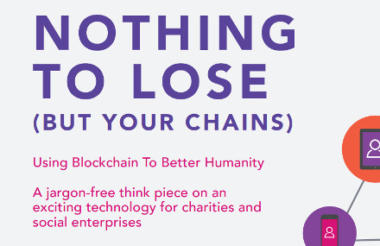If the charity sector does not “step up and get into the guts” of blockchain it risks being left behind, according to a report by Charity Futures.
The think tank commissioned Asheem Singh, former director of policy at Acevo and author, to write the report Using Blockchain to Better Humanity.
Its main findings are that blockchain technology offers charities "huge untapped benefits” but that the sector is “behind the curve”.
The paper argues that charities need to become more involved to shape the debate or they will find themselves unable to influence how it develops.
Singh said: “Fads come and go - but blockchain is here to stay. Charities need to step up and get into the guts of this technology or risk losing out.”
‘Charities must own the debate’
The report summarises some of the examples of how charities could use blockchain, including Disberse, a new platform for transferring money overseas which is being trialled by aid charities, and the Alice fundraising platform.
But it said there are too few examples of charities getting involved.
Singh added: “Money is already pouring into charity and aid blockchain projects. Some - such as those we discuss in the report - are great, others less so. And without significant input from the sector, scarce donor money that could well have been better spent elsewhere will be wasted. This is already happening.
“Charities must own this debate, engage with blockchain and begin to create their own future using these tools, or risk being sidelined as the future takes shape around them.
“I hope this report can help as many in the sector as possible get a foothold. Leadership on blockchain from within the sector is needed urgently and I hope we can come together, get behind Charity Futures and others, and develop the advocacy on this subject that we need.”
‘We need to get better at explaining admin’
Sir Stephen Bubb, director of Charity Futures, said one of the key challenges for the sector was in making sure it makes the case for spending on overheads.
He said there was a “danger” if donors are giving directly to the front line.
“Who will pay to develop charity infrastructure? And how do we ensure we have proper safeguarding arrangements in place if donors don’t want to support the charity by paying for their overhead costs?” He said.
“Oversight and administration are so boring for many people but they are exactly what ensure effective charity. Charities must work even harder to educate donors and the public on the paramount importance of core cost funding.”
|
Related articles









